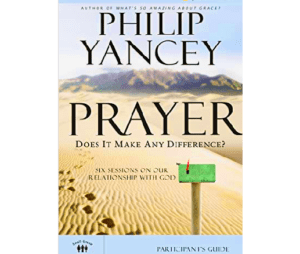Prayer – Does it Make a Difference?
 Victims may approach a relationship with God with distrust and a lot of questions. Philip Yancey is the kind of author that communicates well to such an audience. This book on prayer is not the standard instructional manual nor the straightforward encouragement to pray. As Yancey does in his other books, he takes the questions and objections of others seriously, and admits to his own doubts and struggles. For that reason, this book may be more “in tune” with the Christian who wonders how God didn’t seem to answer a cry for help or healing. Some other books on prayer are written with solid faith that never questions and ponders before arriving at the biblical truth. Hurting people may find that reading Yancey will remove some painful barriers to prayer.
Victims may approach a relationship with God with distrust and a lot of questions. Philip Yancey is the kind of author that communicates well to such an audience. This book on prayer is not the standard instructional manual nor the straightforward encouragement to pray. As Yancey does in his other books, he takes the questions and objections of others seriously, and admits to his own doubts and struggles. For that reason, this book may be more “in tune” with the Christian who wonders how God didn’t seem to answer a cry for help or healing. Some other books on prayer are written with solid faith that never questions and ponders before arriving at the biblical truth. Hurting people may find that reading Yancey will remove some painful barriers to prayer.
I struggle with two common assertions about prayer. Some people credit prayer “working” when, in truth, God did all the “work” as a response to prayer. Admittedly, the Bible speaks in a similar way when it says, “The prayer of a righteous person is powerful and effective” (James 5:16 NIV). And neither the Bible nor Philip Yancey can be accused of treating prayer as though prayer has a mystical power and God is not the receiver of prayer.
The other assertion some Christians make is that prayer is how you get to know God. Not: pray and learn about God from how he answers your prayers. Not: read what God says in the Bible and get to know God as you meditate on what He says. Sometimes writers assert that you pray and God speaks back to you, and you get to know God from this conversation. Yancey makes this assertion at the beginning of Chapter 5: “The main purpose of prayer not to make life easier, nor to gain magical powers, but to know God.” Isn’t prayer our side of the conversation with God? Doesn’t God’s side of the conversation come from the revelation about God on the pages of the Bible, and from experiencing how that revelation applies to our life? Yancey admits that he has not heard God’s audible voice. He admits that prayer often seems one-sided. Prayer is one-sided (unless it is defined as meditation on Scripture). Again, I admit that Yancey doesn’t define prayer as God talking to us as we talk to Him. He quotes Tim Stafford’s book Knowing the Face of God,
I am cautious in interpreting my impulses and feelings as messages from God. I do not want to take the Lord’s name in vain. I do not want to say, “The Lord told me,” when in reality I heard a mental recording of my mother’s voice. I have spent any number of hours talking to God, and he has not yet answered back in a voice that was undeniably his (page 56).
He talks about the experience of prayer as learning to speak to God about the world from his perspective, aligning our will with his as we pray. We begin to understand God, to know God as our prayers shift from what we want to what He wants. But I still question the statement that the “main purpose of prayer [is] . . . to know God.” Yancey doesn’t place this “knowing God” in the Scriptures, and without that explanation, will readers view prayer as the way to know God and as a result grow frustrated in the silence that follows their prayers?
To be fair to Yancey, and to challenge those who might not read his book because of such criticism (of a tiny part of the book, much counter-balanced by other statements he makes), Yancey examines prayer in such detail that many who have a simplistic view of prayer need to read his book so they stop making other false statements out of ignorance which also could frustrate those who struggle and seek God’s help. Yancey examines many questions such as the effect of a positive attitude or faith on recovery. His conclusions are far more nuanced and directed by Scripture and faith in the Father, Son and Holy Spirit, than those who dismiss all discussion of how the body fights disease when teaching about God’s answers to prayer.
Yancey‘s kindliness to the suffering Christian who does not feel grateful, who is angry, resentful, and full of complaints was particularly moving. His consistent expressions of such grace may prove helpful and encouraging to those who have met rejection and frustration from Christians when they cry out in their pain. He mentions a mother who rejoices in the full time care of her invalid child, but then says, “By mentioning this woman I do not mean to compound the guilt of a mother who might wake up every day resenting the demands of her child . . .” (page 280). On the pages of this book, those who still struggle may find hope for their situation in the grace of God and in God’s promises. I was struck by this comment, “If I nurse a grudge and have not the strength to forgive, I present to God that wound, along with the one who inflicted it, and ask for strength I cannot supply on my own. (Could this be why Jesus prayed, ‘Father forgive them . . .’ from the cross rather than pronouncing, ‘I forgive you?’)” (page 313). This statement is followed by a story of a woman who interpreted praying for our enemies as applying to praying for the man who molested her daughter. She said she struggled daily to forgive and worried that by forgiving she’ll minimize the pain and suffering she caused. This example of what Yancey is talking about helps those who struggle to look closer at what Yancey just wrote about asking for strength to forgive.
The book contains many inserts—stories and comments by others that illustrate the point being made in that chapter, or provoking further thought. The inserts acted as a stimulus while reading each chapter, providing alternate voices to the authors.
A vast number of classic books have been written on prayer and Yancey catalogs many of the most famous. While I have a couple of other favorites, I would recommend this book to anyone who, having been deeply harmed by someone, has a spiritual struggle or feels estranged from God. I’ve not encountered a book that takes this pain as seriously as this book, and provides helpful and healing responses directed at hearts that have been betrayed.
Buy Now
Author: Philip Yancey
368 pages
Reviewed by: James Behringer on June 9, 2015



